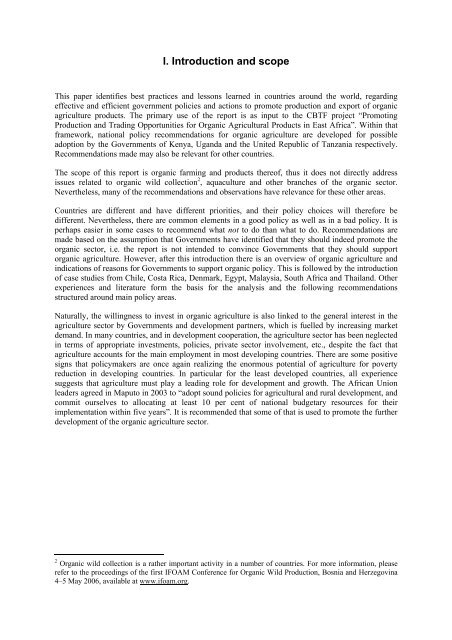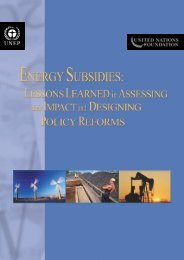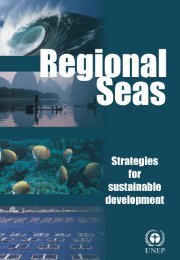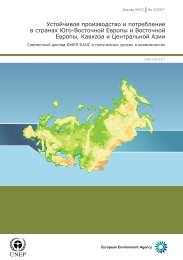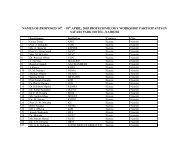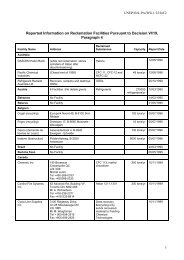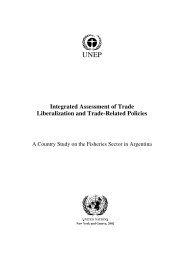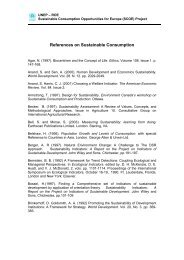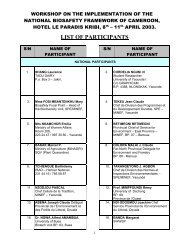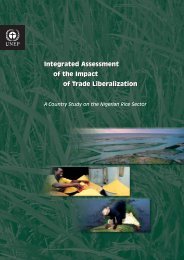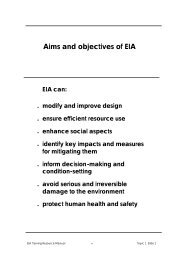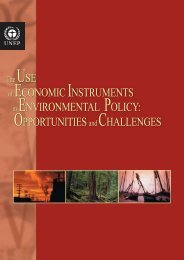Best Practices for Organic Policy - What developing country - UNEP
Best Practices for Organic Policy - What developing country - UNEP
Best Practices for Organic Policy - What developing country - UNEP
You also want an ePaper? Increase the reach of your titles
YUMPU automatically turns print PDFs into web optimized ePapers that Google loves.
I. Introduction and scope<br />
This paper identifies best practices and lessons learned in countries around the world, regarding<br />
effective and efficient government policies and actions to promote production and export of organic<br />
agriculture products. The primary use of the report is as input to the CBTF project “Promoting<br />
Production and Trading Opportunities <strong>for</strong> <strong>Organic</strong> Agricultural Products in East Africa”. Within that<br />
framework, national policy recommendations <strong>for</strong> organic agriculture are developed <strong>for</strong> possible<br />
adoption by the Governments of Kenya, Uganda and the United Republic of Tanzania respectively.<br />
Recommendations made may also be relevant <strong>for</strong> other countries.<br />
The scope of this report is organic farming and products thereof, thus it does not directly address<br />
issues related to organic wild collection 2 , aquaculture and other branches of the organic sector.<br />
Nevertheless, many of the recommendations and observations have relevance <strong>for</strong> these other areas.<br />
Countries are different and have different priorities, and their policy choices will there<strong>for</strong>e be<br />
different. Nevertheless, there are common elements in a good policy as well as in a bad policy. It is<br />
perhaps easier in some cases to recommend what not to do than what to do. Recommendations are<br />
made based on the assumption that Governments have identified that they should indeed promote the<br />
organic sector, i.e. the report is not intended to convince Governments that they should support<br />
organic agriculture. However, after this introduction there is an overview of organic agriculture and<br />
indications of reasons <strong>for</strong> Governments to support organic policy. This is followed by the introduction<br />
of case studies from Chile, Costa Rica, Denmark, Egypt, Malaysia, South Africa and Thailand. Other<br />
experiences and literature <strong>for</strong>m the basis <strong>for</strong> the analysis and the following recommendations<br />
structured around main policy areas.<br />
Naturally, the willingness to invest in organic agriculture is also linked to the general interest in the<br />
agriculture sector by Governments and development partners, which is fuelled by increasing market<br />
demand. In many countries, and in development cooperation, the agriculture sector has been neglected<br />
in terms of appropriate investments, policies, private sector involvement, etc., despite the fact that<br />
agriculture accounts <strong>for</strong> the main employment in most <strong>developing</strong> countries. There are some positive<br />
signs that policymakers are once again realizing the enormous potential of agriculture <strong>for</strong> poverty<br />
reduction in <strong>developing</strong> countries. In particular <strong>for</strong> the least developed countries, all experience<br />
suggests that agriculture must play a leading role <strong>for</strong> development and growth. The African Union<br />
leaders agreed in Maputo in 2003 to “adopt sound policies <strong>for</strong> agricultural and rural development, and<br />
commit ourselves to allocating at least 10 per cent of national budgetary resources <strong>for</strong> their<br />
implementation within five years”. It is recommended that some of that is used to promote the further<br />
development of the organic agriculture sector.<br />
2 <strong>Organic</strong> wild collection is a rather important activity in a number of countries. For more in<strong>for</strong>mation, please<br />
refer to the proceedings of the first IFOAM Conference <strong>for</strong> <strong>Organic</strong> Wild Production, Bosnia and Herzegovina<br />
4–5 May 2006, available at www.ifoam.org.


